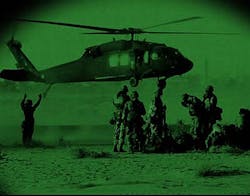DRS to develop enabling technologies for special-ops multispectral night-vision goggles
MacDILL AFB, Fla., 29 July 2013.Night vision experts at the U.S. Special Operations Command (SOCOM) at MacDill Air Force Base, Fla., needed advanced night-vision goggles that enable warfighters to see several different spectra of light. They found their solution from DRS RSTA in Dallas.
SOCOM officials announced a $1.6 million research contract to the DRS Technologies Inc. Reconnaissance, Surveillance, and Target Acquisition segment (DRS RSTA) late last week to help develop advanced digital multispectral night-vision goggles.
Multispectral sensors capture image data at specific frequencies across the electromagnetic spectrum. The wavelengths may be separated by filters or by the use of instruments that are sensitive to particular wavelengths, including light from frequencies beyond the visible light range, such as infrared.
Multispectral night-vision devices seek to blend several different kinds of sensors to combine their strengths. Essentially these sensors can overlay the images of different night-vision sensors such that the resulting combined image is greater than the sum of its parts.
Analog light-amplification tubes, for example, are economical and power efficient, but cannot see in total darkness. Longwave infrared sensors can see in total darkness, but cannot see through windows. Short-wave infrared (SWIR) sensors are good at detecting targets hiding in foliage.
Blending two or more kinds of night-vision sensors in a multispectral night vision goggle could capitalize on each sensor's strengths, and mitigate their weaknesses. A multispectral night-vision goggle, for example, might be able to see through windows, in total darkness, and penetrate foliage.
Multispectral sensors historically have been relatively large and expensive, which would not be acceptable for a night-vision goggle. Among the challenges that DRS RSTA engineers face is combining sensors in a small, lightweight, affordable package.
The company's 10-month research contract with SOCOM extends through April 2014. DRS RSTA will do the work in Dallas.
For more information contact DRS RSTA online at www.drs.com/Products/RSTA, or SOCOM at www.socom.mil.

